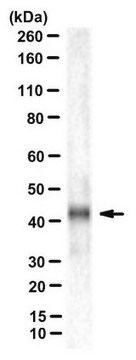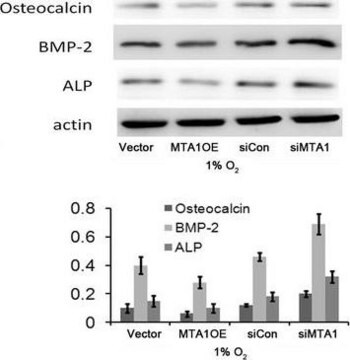AB1857
Anti-Osteocalcin Antibody, a.a. 1-22
serum, Chemicon®
Synonym(s):
Anti-BGP
Sign Into View Organizational & Contract Pricing
All Photos(1)
About This Item
UNSPSC Code:
12352203
eCl@ss:
32160702
NACRES:
NA.41
Recommended Products
biological source
rabbit
Quality Level
antibody form
serum
antibody product type
primary antibodies
clone
polyclonal
species reactivity
human
manufacturer/tradename
Chemicon®
technique(s)
ELISA: suitable
radioimmunoassay: suitable
NCBI accession no.
UniProt accession no.
shipped in
wet ice
target post-translational modification
unmodified
Gene Information
human ... BGLAP(632)
Specificity
Recognizes human osteocalcin (1-22) mature form. Also reacts with osteocalcin (1-44) and osteocalcin (1-49). No reactivity with human bone sialoprotein and human osteonectin.
Immunogen
Epitope: a.a. 1-22
Synthetic peptide corresponding to amino acids 1-22 of human Osteocalcin (MRALTLLALLALAALCIAGQAG).
Application
Anti-Osteocalcin Antibody, a.a. 1-22 detects level of Osteocalcin & has been published & validated for use in ELISA, RIA.
RIA (1:2000)
ELISA (1:5000)
Optimal working dilutions must be determined by the end user.
ELISA (1:5000)
Optimal working dilutions must be determined by the end user.
Research Category
Neuroscience
Neuroscience
Research Sub Category
Hormones & Receptors
Hormones & Receptors
Linkage
Replaces: MABD182
Physical form
Rabbit serum. Lyophilized. Reconstitute with 100 μL of sterile distillled water.
Storage and Stability
Maintain lyophilized material at 2-8°C. After reconstitution maintain at -20°C in undiluted aliquots for up to 6 months. Avoid repeated freeze/thaw cycles.
Legal Information
CHEMICON is a registered trademark of Merck KGaA, Darmstadt, Germany
Disclaimer
Unless otherwise stated in our catalog or other company documentation accompanying the product(s), our products are intended for research use only and are not to be used for any other purpose, which includes but is not limited to, unauthorized commercial uses, in vitro diagnostic uses, ex vivo or in vivo therapeutic uses or any type of consumption or application to humans or animals.
Not finding the right product?
Try our Product Selector Tool.
recommended
Product No.
Description
Pricing
Storage Class Code
10 - Combustible liquids
Certificates of Analysis (COA)
Search for Certificates of Analysis (COA) by entering the products Lot/Batch Number. Lot and Batch Numbers can be found on a product’s label following the words ‘Lot’ or ‘Batch’.
Already Own This Product?
Find documentation for the products that you have recently purchased in the Document Library.
Laurent A Tchang et al.
Journal of tissue engineering and regenerative medicine, 11(5), 1542-1552 (2015-06-17)
The use of fetal bovine serum (FBS) as a culture medium supplement in cell therapy and clinical tissue engineering is challenged by immunological concerns and the risk of disease transmission. Here we tested whether human, thrombin-activated, pooled, platelet-rich plasma (tPRP)
Huawen Ding et al.
Journal of cell science, 125(Pt 22), 5564-5577 (2012-09-05)
Nitric oxide (NO) has been shown to play a crucial role in bone formation in vivo. We sought to determine the temporal effect of NO on murine embryonic stem cells (ESCs) under culture conditions that promote osteogenesis. Expression profiles of
Rodrigo A Grandy et al.
Molecular and cellular biology, 36(4), 615-627 (2015-12-09)
Stem cell phenotypes are reflected by posttranslational histone modifications, and this chromatin-related memory must be mitotically inherited to maintain cell identity through proliferative expansion. In human embryonic stem cells (hESCs), bivalent genes with both activating (H3K4me3) and repressive (H3K27me3) histone
Laminin-5 induces osteogenic gene expression in human mesenchymal stem cells through an ERK-dependent pathway.
Klees, RF; Salasznyk, RM; Kingsley, K; Williams, WA; Boskey, A; Plopper, GE
Molecular Biology of the Cell null
Elena Filová et al.
International journal of nanomedicine, 9, 3687-3706 (2014-08-16)
Hydroxyapatite (HA) is considered to be a bioactive material that favorably influences the adhesion, growth, and osteogenic differentiation of osteoblasts. To optimize the cell response on the hydroxyapatite composite, it is desirable to assess the optimum concentration and also the
Our team of scientists has experience in all areas of research including Life Science, Material Science, Chemical Synthesis, Chromatography, Analytical and many others.
Contact Technical Service








